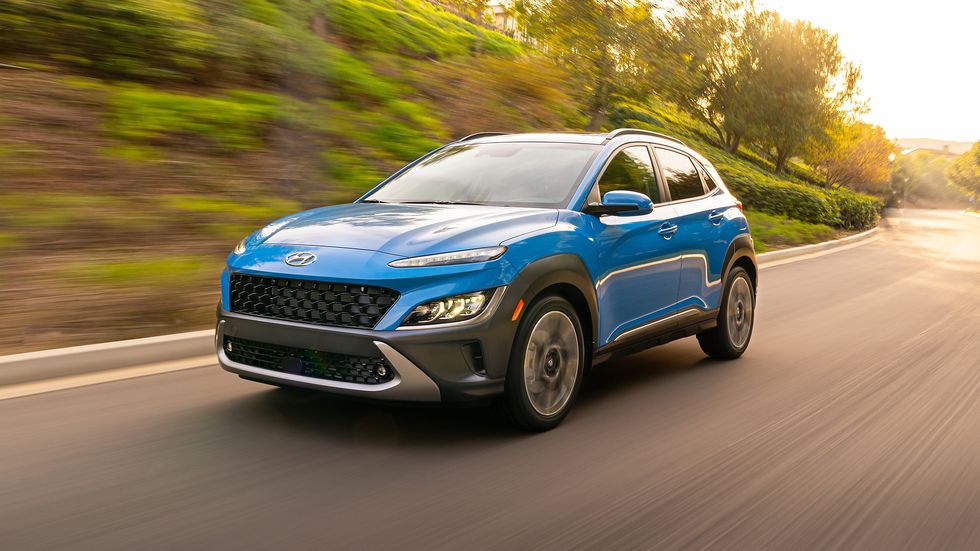- Hyundai and Kia are struggling with quality issues lately, with the latest recall for the Korean brands focusing on electrical fire risk.
- Around 113,000 vehicles are included in this recall, with Hyundai’s bread-and-butter crossovers and Kia’s affordable compact offerings now under a nationwide stop sale.
- The NHTSA is urging current owners to park their vehicles outside and away from buildings, though the number of units actually at risk of fire remains around 1%.
Electric vehicle fires have been making headlines lately, with everything from container ships carrying electric cars to electrified personal mobility scooters sparking fear above the future of electric propulsion. But it’s important to remember that internal-combustion vehicles are prone to fire, too, as exampled by a mass recall from Hyundai and Kia.
Officially published on July 27, Hyundai and Kia issued a joint statement recalling 113,000 newer vehicles in North America due to a severe fire risk. Specifically, 2023-2024 Hyundai Palisade, 2023 Hyundai Tucson, Sonata, Elantra, and Kona vehicles as well as 2023-2024 Kia Seltos and 2023 Kia Soul and Sportage vehicles are affected by the recall.
The Hyundai Palisade remains the most affected model, with 28,623 units recalled, though the Hyundai Kona isn’t far behind with 13,160 units recalled. More than 20,000 Kia Souls are also affected, rising above its bigger Seltos and Sportage siblings by a wide margin.
In conjunction with the National Highway Traffic Safety Administration, the Korean automakers urged owners to park outside and away from structures to limit potential fire spreading. Ironically, the fire-prone part used in all eight models is actually supposed to help reduce environmental impact.
“The transmission electric oil pump for the Idle Stop & Go System in the subject vehicles may have been assembled with printed circuit boards that were damaged during manufacturing,” recall documents from the NHTSA read. “A damaged capacitor on the pump controller PCB could impact electrical operation leading to heat damage to the electric oil pump circuit board, connector, and wiring harness.”
In producing a fuel-saving engine stop-start, it seems one of Hyundai’s and Kia’s suppliers made an electrical mistake, one that will likely cost the brands a pretty penny. But current owners of these vehicles shouldn’t panic just yet, as the NHTSA estimates only about 1% of affected models will actually suffer from heat-damaged electronics.
It appears that Hyundai caught the issue somewhat early, as the NHTSA chronology report begins in December 2022 and the thermal issue was confirmed just a few weeks ago. Additionally, Kia wasn’t notified of the issue until May 2023, as the initial fire happened on a 2023 Hyundai Palisade.
All told, Hyundai has recorded four fires (all on Palisades) while Kia reported no fires but six incidents of localized melting. There are no confirmed crashes or injuries related to this defect.
Both companies are still working on a solution and will provide a service rental vehicle to those who don’t feel safe driving their vehicles, according to filings with the NHTSA. Notably, Hyundai and Kia say owners can continue to drive their vehicles if they wish, though a stop-sale at dealerships nationwide is in effect.
This is not the first time Hyundai has issued a recall over transmission issues. Late last year, Hyundai issued a recall of certain N-line models using its proprietary 8-speed dual-clutch transmission. Additionally, both brands continue to struggle with theft issues, though a preliminary fix is available and being rolled out nationwide.
Has your vehicle ever been subject to a sweeping recall? How were you accommodated? Please share your thoughts below.
Associate Editor
A New York transplant hailing from the Pacific Northwest, Emmet White has a passion for anything that goes: cars, bicycles, planes, and motorcycles. After learning to ride at 17, Emmet worked in the motorcycle industry before joining Autoweek in 2022. The woes of alternate side parking have kept his fleet moderate, with a 2014 Volkswagen Jetta GLI and a 2003 Honda Nighthawk 750 street parked in his South Brooklyn community.
Read the full article here



